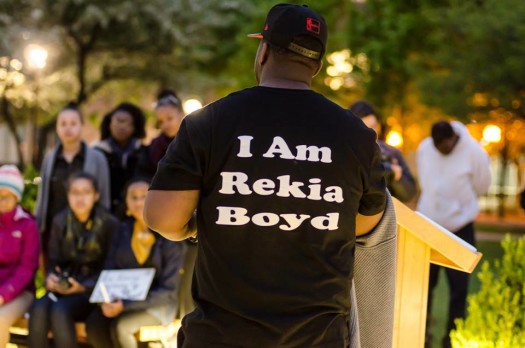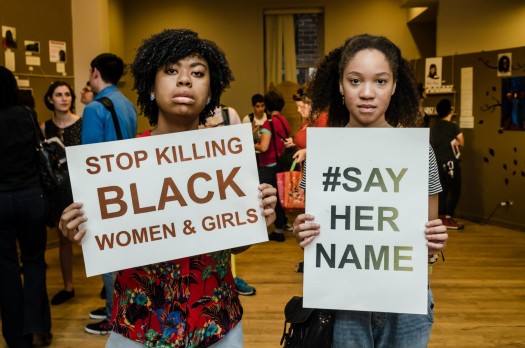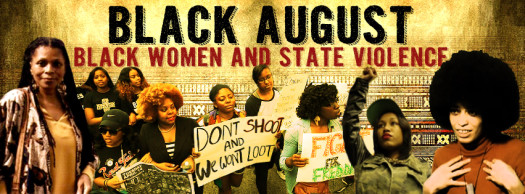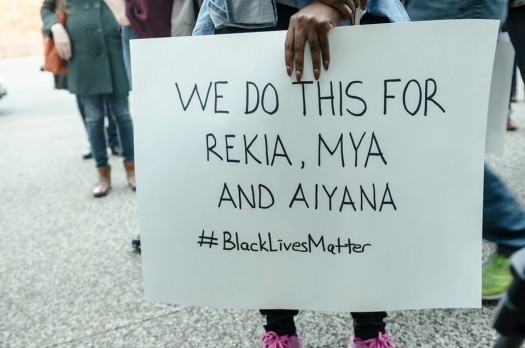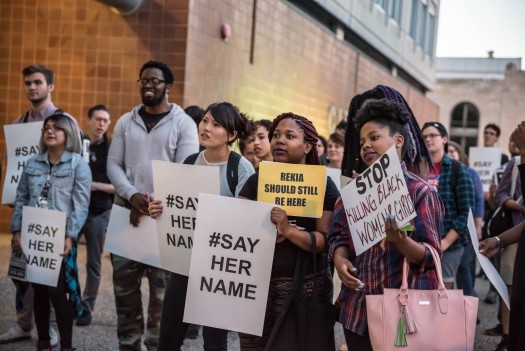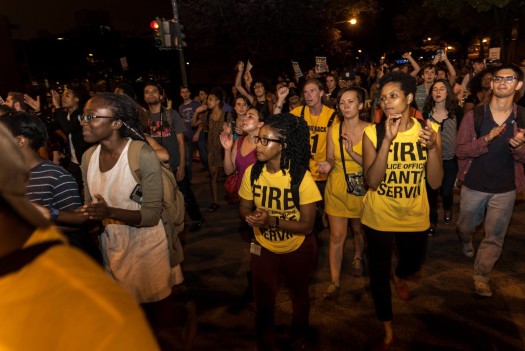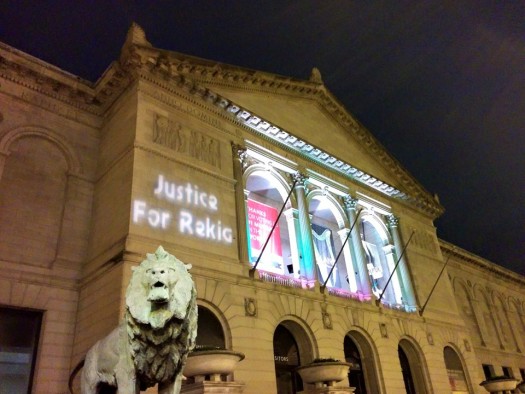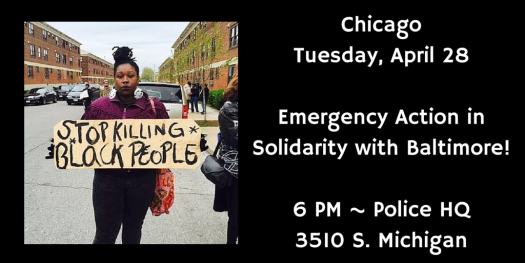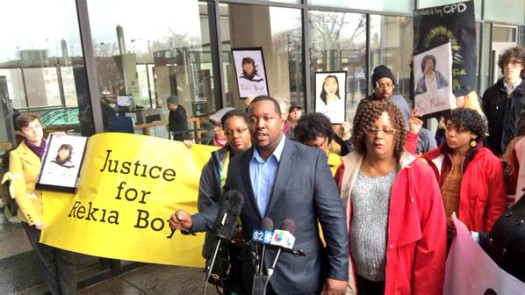#FireDanteServin: An Abolitionist Campaign in Chicago
On April 20th, I was getting on a plane headed back to Chicago from Nashville when my phone started ringing. Friends who were in the courtroom as the judge acquitted officer Dante Servin for killing Rekia Boyd were calling to share the news. Martinez Sutton, Rekia’s brother, was so gutted that he couldn’t contain his pain. He and others were temporarily detained by police. Rekia’s family, friends and community were devastated. Dante Servin was free. How long before he would again patrol the streets with his gun? How long before he might kill someone else? How long before the next Rekia? How long before Rekia’s mother could finally sleep soundly through the night?
I was not surprised that Dante Servin was acquitted. After all, it took months and years of community agitation and organizing to get him indicted in the first place. By all accounts, the prosecution’s heart was not in the case. More than that, as most now understand, police officers are rarely indicted and almost never convicted.
Rekia was still dead and Dante Servin still had his job and pension.
A couple of days later, about 11 people representing several organizations including BYP 100, Project NIA, BLM Chicago, WAPB, FURIE, ISO, We Charge Genocide, and Chicago Taskforce on Violence against Girls & Young Women met on the Southside to brainstorm and discuss next steps in the struggle for justice for Rekia. Those in attendance identified as abolitionists, progressives, socialists and anarchists. Our goal was to develop a strategy to keep Rekia’s name alive and to continue to support her family.
It was unlikely that the country would come to know her by her first name: Rekia. She was young, Black and a woman. Of those identities, being a woman is a distinct disadvantage in the political economy of public memorialization. The names that we lift up (when we memorialize Black life at all) are usually attached to cisgendered heterosexual men: Sean, Mike, Eric, Rodney, Amadou… And yet, here we now are, also saying Rekia’s name alongside theirs. This didn’t happen by chance. Her family and local organizers have insisted that her life mattered. The meeting we held after the Servin verdict was a declaration that Rekia would not be forgotten and that her family would not be abandoned.
By the end of the meeting, we had agreed to collectively organize several events and actions through the spring and summer. Groups and individuals volunteered to bottom line several projects. Project NIA & the Taskforce took responsibility for organizing a legal teach-in about the case that would take place the next week. That event sent Depaul Law School and the Chicago Police Department (CPD) into a panic. On the heels of the Baltimore uprisings, they deployed dozens of police officers to surveil and monitor attendees. Project NIA also took responsibility for coordinating a month-long series of events under the banner of “Black August Chicago.” These events, actions and interventions would focus on state violence against Black women and girls (trans and non-trans) and contextualize these experiences historically. Most of the groups at the meeting committed to organize an event/action/intervention during Black August.
BYP 100 committed to reach out to national groups to organize a National Day of Action for Black Women and Girls on May 21st. BLM Chicago, We Charge Genocide and WAPB decided to attend the next police board meeting to demand the firing of Dante Servin. Since that board meeting would be on May 21st, it worked out that the BYP 100 National Day of Action for Black Women and Girls local event would dovetail with the effort to #FireServin.
Since May, BYP 100 along with the other groups mentioned have consistently attended police board meetings to demand the firing of Rekia’s killer. The most recent action happened this past Thursday. The beautiful video below offers some highlights.
As a by-product of the community’s organizing, the Independent Police Review Authority (IPRA) this week recommended the firing of Servin. CPD Superintendent McCarthy now has 90 days to offer his recommendation which would then go to the Police Board for a final vote. So there are more steps and work ahead. In the meantime, the relationships between individuals and groups organizing to #FireServin and against police violence more generally are deepening and the number of people joining the mobilizations is growing.
There has been some criticism about the strategic value of a campaign focused on firing one police officer. Isn’t this simply individualizing harm? Shouldn’t we be taking a systemic/structural approach to addressing police violence? These are certainly valid questions. After all, Chicago is a city where Black people (in particular) are killed by police in the highest numbers and with impunity. We are a city where the parents of young Black people shot by police have to crowdfund to buy a headstone for their sons and daughters. We are a city where grief stricken family and community members are arrested for disrupting the courtroom after a judge dismisses the charges against a killer cop. We are a city where the press ignored allegations of police torture for decades and continue to do so into the present. We are a city where the county prosecutors don’t hold killer cops accountable.
None of the organizers leading the #FireServin actions believe that his dismissal from the force will end police violence. Servin is buttressed and backed by a culture of impunity and by a history of Black-deathmaking in this city. He is one brick in a reinforced wall. Just a brick. Organizers know this. So why focus on Servin at all? I’ll share some reasons below:
1. The demand to fire Servin is consistent with abolitionist goals in that it addresses the issue of accountability for harm caused.
2. The demand to fire Servin is in response to the desire of a devastated family and community to see a modicum of justice for their daughter, sister, friend and fellow human being.
3. The demand to fire Servin exists within a broader set of mobilizations and actions that are about MAKING all #BlackWomenAndGirlsLivesMatter.
4. The demand to fire Servin has an origin story rooted in collective brainstorming and organizing. It has provided a tangible way to build power through the mobilizations.
5. The demand to fire Servin has provided an opportunity for some individuals and groups to collaborate more closely and to get to know each other in ways that will only strengthen our broader local struggle. If we learn to fight together, we can win together.
6. The demand to fire Servin has not and does not preclude others from pursuing and taking on their own campaigns to end police violence. Moreover, campaign organizers themselves are involved in more than just efforts to fire Servin.
In Rekia’s name, organizers in Chicago have launched a sustained mobilization seeking justice for all Black women and girls (trans and non-trans). It’s remarkable, really. All of the #SayHerName & #JusticeForRekia actions and mobilizations that happened across the country on May 21st had their roots here in Chicago. It has been rare in U.S. history to effectively organize at the intersection of race and gender. And yet, in part because of our work seeking #JusticeForRekia, there is some energy behind a focus on state violence against all Black women and girls. And this matters a great deal. The recent attention paid to Sandra Bland, Natasha McKenna and the ongoing killings of trans Black women is partly owed to this mobilization.
A focus on how women and girls experience violence by the state pushes us to consider more than lethal force as harmful. We have to consider sexual assaults by police (inside prisons and in the streets). We have to include how women who are victims of interpersonal violence are criminalized by the state for defending their lives. Our lens becomes wider. Hence, the #FireServin campaign has not simply been about holding one officer accountable. It’s also been about making visible the neglected forms of violence experienced by Black women and girls across this country and beyond. By calling for CPD to #FireServin, organizers in Chicago have centered the state violence experienced by all Black women and girls and shone a light on what my friend Andy Smith accurately describes as an “entire system of harassment and surveillance that keeps oppressive gender and racial hierarchies in place.”
